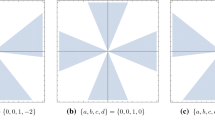Abstract:
We investigate the relevance of Eisenstein series for representing certain G(ℤ)-invariant string theory amplitudes which receive corrections from BPS states only. G(ℤ) may stand for any of the mapping class, T-duality and U-duality groups Sl(d,(ℤ), SO(d,d,(ℤ) or E d +1( d +1)((ℤ) respectively. Using G(ℤ)-invariant mass formulae, we construct invariant modular functions on the symmetric space K\G(ℝ) of non-compact type, with K the maximal compact subgroup of G(ℝ), that generalize the standard non-holomorphic Eisenstein series arising in harmonic analysis on the fundamental domain of the Poincaré upper half-plane. Comparing the asymptotics and eigenvalues of the Eisenstein series under second order differential operators with quantities arising in one- and g-loop string amplitudes, we obtain a manifestly T-duality invariant representation of the latter, conjecture their non-perturbative U-duality invariant extension, and analyze the resulting non-perturbative effects. This includes the R 4 and R 4 H 4 g -4 couplings in toroidal compactifications of M-theory to any dimension D≥ 4 and D≥ 6 respectively.
Similar content being viewed by others
Author information
Authors and Affiliations
Additional information
Received: 17 March 1999 / Accepted: 16 July 1999
Rights and permissions
About this article
Cite this article
Obers, N., Pioline, B. Eisenstein Series and String Thresholds. Comm Math Phys 209, 275–324 (2000). https://doi.org/10.1007/s002200050022
Issue Date:
DOI: https://doi.org/10.1007/s002200050022



